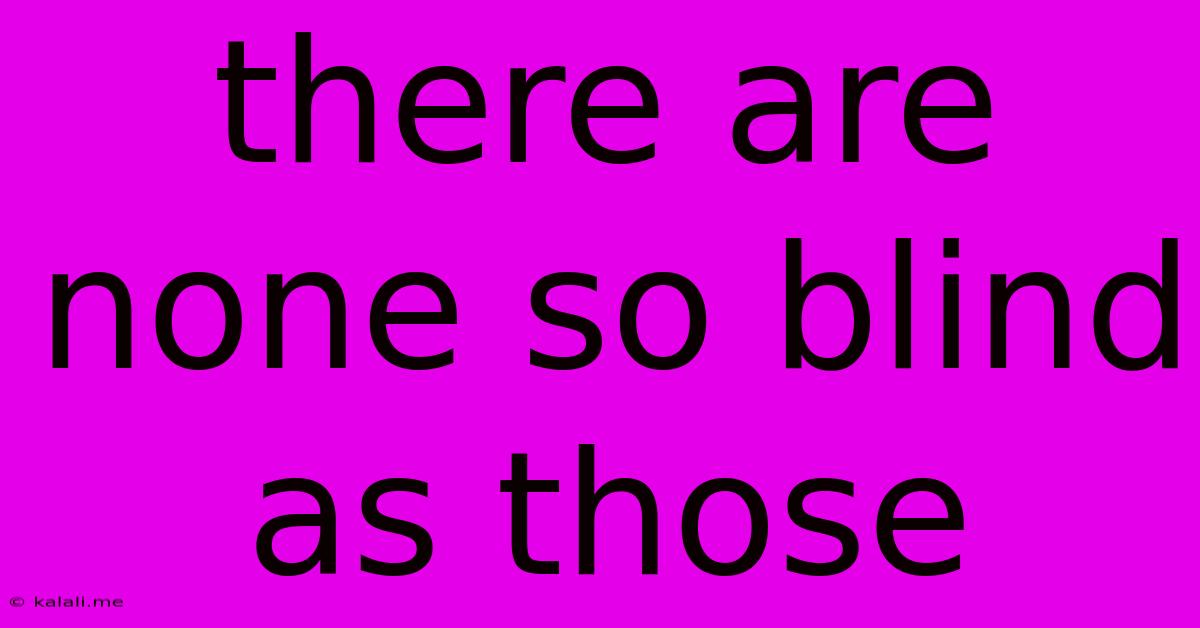There Are None So Blind As Those
Kalali
May 22, 2025 · 3 min read

Table of Contents
There Are None So Blind As Those Who Will Not See: Exploring the Proverb's Meaning and Relevance
The proverb "There are none so blind as those who will not see" speaks volumes about the human condition. It's a powerful statement about willful ignorance, highlighting the self-imposed blindness that prevents individuals from acknowledging uncomfortable truths or perspectives. This article will delve into the deeper meaning of this proverb, exploring its implications in various contexts and its enduring relevance in today's world.
What Does the Proverb Truly Mean?
At its core, the proverb isn't about literal blindness. It's a metaphorical expression describing individuals who, despite having the capacity to understand and perceive reality, choose to remain oblivious. This refusal to see isn't caused by a lack of visual acuity, but rather by a stubborn resistance to facing uncomfortable facts, challenging beliefs, or acknowledging inconvenient truths. This willful blindness can stem from various factors, including:
-
Cognitive Biases: Our brains are wired to confirm our existing beliefs. Confirmation bias leads us to selectively interpret information, favoring evidence that supports our preconceived notions while dismissing contradictory data.
-
Emotional Defenses: Facing difficult truths can be emotionally painful. To avoid this discomfort, individuals might unconsciously choose to remain blind to the reality of a situation. This can manifest as denial, avoidance, or rationalization.
-
Ideological Rigidity: Strong adherence to specific ideologies or beliefs can blind individuals to alternative viewpoints. This rigidity prevents critical self-reflection and limits the capacity for intellectual growth and empathy.
-
Fear of Change: Acknowledging uncomfortable truths often requires significant personal or societal change. The fear of this disruption can motivate individuals to cling to their existing beliefs, even when confronted with overwhelming evidence to the contrary.
Examples of Willful Blindness in Action:
The proverb's relevance is evident in numerous scenarios:
-
Political Polarization: The increasing political polarization in many societies exemplifies this phenomenon. Individuals often selectively consume information that reinforces their existing political views, ignoring or dismissing opposing perspectives. This creates echo chambers where critical thinking is stifled and compromise becomes increasingly difficult.
-
Social Issues: Willful blindness frequently manifests in discussions surrounding social issues like racism, sexism, and inequality. Individuals may downplay or deny the existence of systemic issues, clinging to narratives that reinforce their comfort zones and avoid confronting uncomfortable truths about privilege and oppression.
-
Personal Relationships: In personal relationships, willful blindness can prevent individuals from acknowledging problematic behaviors or patterns within the relationship. This can lead to prolonged conflict, resentment, and ultimately, relationship breakdown.
-
Environmental Issues: The climate change debate provides a stark example. Despite overwhelming scientific consensus, some individuals continue to deny or downplay the severity of the climate crisis, resisting calls for significant changes in behavior and policy.
Overcoming Willful Blindness:
While willful blindness is a powerful force, it's not insurmountable. Cultivating self-awareness, critical thinking skills, and a willingness to engage with diverse perspectives are crucial steps in overcoming this tendency. This involves:
-
Actively seeking diverse viewpoints: Consciously exposing oneself to perspectives that differ from one's own can help challenge ingrained biases and broaden understanding.
-
Practicing critical thinking: Developing the ability to evaluate information objectively, identify logical fallacies, and assess the credibility of sources is essential for combating misinformation and bias.
-
Embracing intellectual humility: Recognizing the limits of one's own knowledge and being open to the possibility of being wrong are crucial for personal growth and intellectual honesty.
Conclusion:
"There are none so blind as those who will not see" remains a timeless and relevant proverb. By understanding the underlying mechanisms of willful blindness and actively working to overcome them, we can foster a more informed, empathetic, and just society. The challenge lies in cultivating the courage to confront uncomfortable truths and the intellectual honesty to embrace diverse perspectives, even when it's difficult. Only then can we truly see.
Latest Posts
Latest Posts
-
Getting Rid Of Mold On Bathroom Ceiling
May 22, 2025
-
Beer In The Freezer How Long
May 22, 2025
-
The Rabbit Is Out Of The Hat
May 22, 2025
-
French Movies With English And French Subtitles
May 22, 2025
-
Wiring Diagram For Nest Heat Link
May 22, 2025
Related Post
Thank you for visiting our website which covers about There Are None So Blind As Those . We hope the information provided has been useful to you. Feel free to contact us if you have any questions or need further assistance. See you next time and don't miss to bookmark.